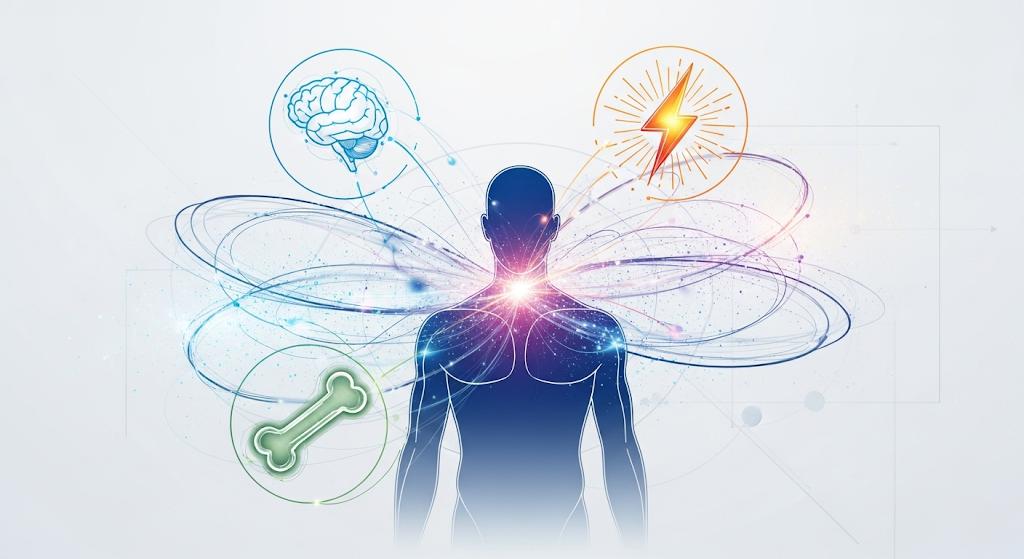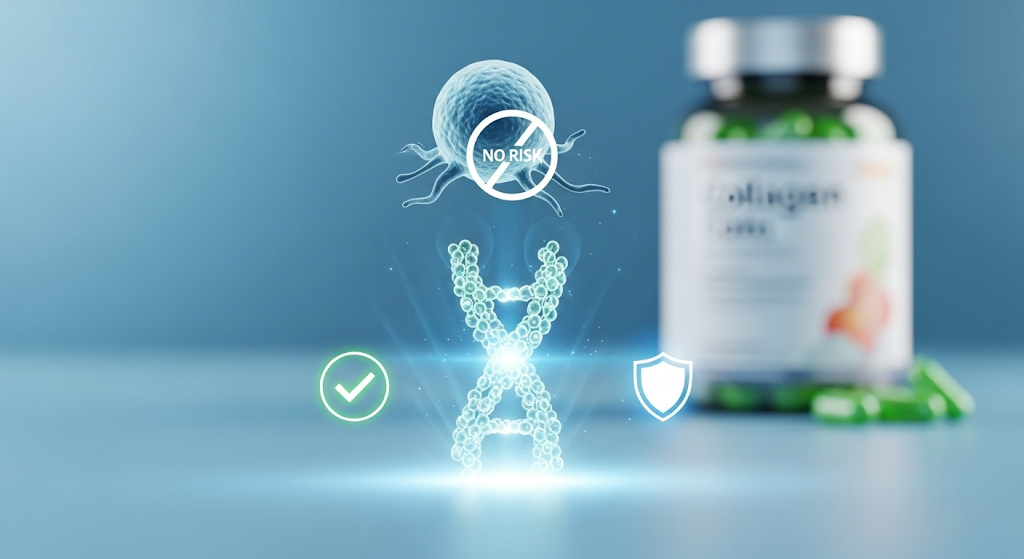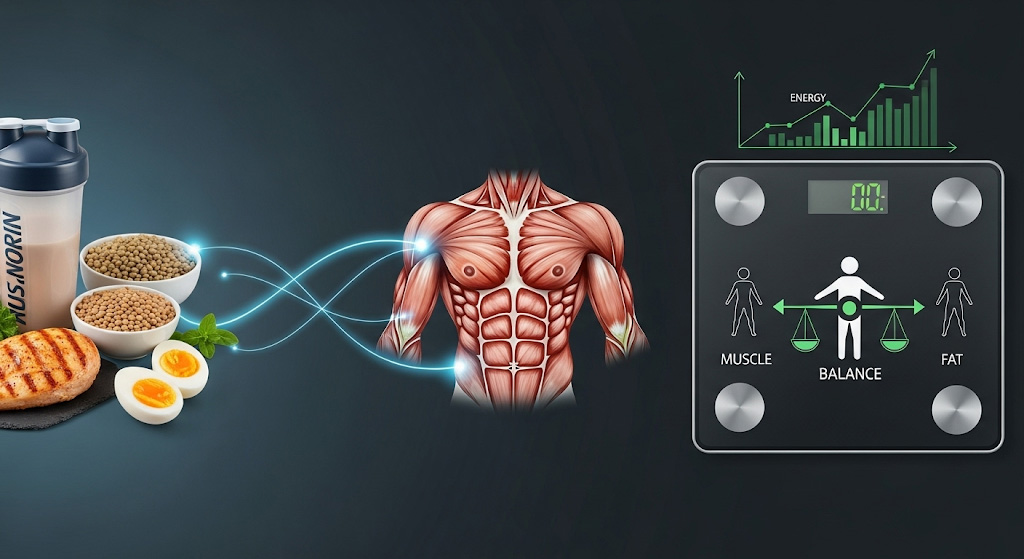
Creatine stands as one of the most rigorously researched and widely adopted supplements in the athletic and fitness world, particularly among men. Its reputation for significantly enhancing muscle mass, boosting strength, and improving exercise performance is well-earned, backed by decades of scientific inquiry. While its fundamental benefits are universal, men, who often have larger muscle mass and engage in high-intensity, power-focused training, frequently experience particularly pronounced and desired outcomes. This comprehensive article delves into the intricate science of what creatine specifically does for men, exploring its mechanisms of action, its multifaceted impact on muscle growth and athletic prowess, its broader health implications, and practical guidance for optimal use.
I. Understanding Creatine The Fuel Behind Performance
To fully grasp creatine's profound effects on men, it's essential to revisit its fundamental nature and how it operates within the human body.
A. What is Creatine? Creatine is a naturally occurring organic acid, not a steroid. It's synthesized primarily in the liver, kidneys, and pancreas from three amino acids: L-arginine, glycine, and L-methionine. Roughly 95% of the body's creatine stores reside within skeletal muscle, with smaller, yet crucial, amounts found in the brain and testes. While dietary sources like red meat and fish provide some creatine, supplementation allows for the saturation of muscle stores to levels not typically achievable through diet alone.
B. The ATP-PCr Energy System: How Creatine Works Creatine's primary function is intricately linked to the body's most immediate energy system for high-intensity activities: the ATP-Phosphocreatine (ATP-PCr) system.
-
ATP (Adenosine Triphosphate): This is the direct energy currency of every cell. When a muscle contracts, ATP is hydrolyzed (breaks down) into ADP (Adenosine Diphosphate) and a phosphate group, releasing energy. However, muscle cells only store enough ATP for a few seconds of maximal effort.
-
Phosphocreatine (PCr): Inside muscle cells, excess creatine is phosphorylated (combines with a phosphate group) to form phosphocreatine. PCr acts as a rapid energy reserve.
-
Rapid ATP Regeneration: When ATP levels drop sharply during intense exercise (e.g., a heavy lift, a sprint), PCr quickly donates its phosphate group to ADP, rapidly regenerating ATP. This is a crucial, high-speed energy pathway that operates anaerobically (without oxygen).
-
Extending Peak Performance: By increasing the available pool of PCr in muscle cells, creatine supplementation allows men to sustain maximal power output and high-intensity effort for slightly longer durations before fatigue sets in. This translates directly to more repetitions, heavier lifts, or faster sprints. The ability to perform just one or two more high-quality repetitions per set, compounded over weeks and months, significantly accelerates adaptation and growth.
II. Creatine and Muscle Growth in Men A Multi-Faceted Approach
For many men, the pursuit of increased muscle mass (hypertrophy) is a primary fitness goal. Creatine's ability to facilitate this goes beyond simple energy provision, encompassing several synergistic mechanisms:
-
Enhanced Training Volume and Intensity (Direct and Indirect):
-
Direct: As explained, creatine increases ATP availability, allowing you to perform more reps or lift heavier weights within a set.
-
Indirect: This increased capacity translates to greater training volume over time. Higher training volume (total sets x reps x weight lifted) is a primary driver of muscle hypertrophy. Men can push their muscles closer to their limits, stimulating greater adaptive responses.
-
-
Cell Volumization (The "Pump"): Creatine is an osmotically active substance, meaning it draws water into the muscle cells. This leads to a noticeable increase in muscle cell volume, often described as a "fuller" or "pumped" look. While some might dismiss this as mere water retention, this cellular swelling is believed to act as an anabolic signal. It may stretch the cell membrane, initiating pathways that signal increased protein synthesis and potentially reduce protein breakdown, thus contributing to long-term muscle growth.
-
Increased Protein Synthesis: Some studies suggest a more direct role for creatine in muscle building by stimulating pathways involved in protein synthesis (the process of building new muscle tissue). This could involve influencing mTOR (mammalian target of rapamycin) signaling, a key regulator of cell growth and protein synthesis.
-
Reduced Muscle Protein Breakdown: Beyond building new muscle, preventing the breakdown of existing muscle tissue is equally crucial for net muscle gain. Research indicates that creatine might help reduce muscle protein degradation, tipping the scales further towards muscle accumulation.
-
Modulation of Myostatin: Myostatin is a protein that inhibits muscle growth. Some preliminary research suggests that creatine supplementation might help reduce myostatin levels, thereby potentially removing a "brake" on muscle hypertrophy.
-
Enhanced Satellite Cell Activity: Satellite cells are adult stem cells located on the outer surface of muscle fibers. They play a critical role in muscle repair and growth, especially after exercise-induced damage. Creatine may enhance the activity and proliferation of these satellite cells, contributing to greater muscle regeneration and hypertrophy.
-
Increased Anabolic Hormone Levels (Potential): While not its primary mechanism, some studies have observed that creatine supplementation can lead to transient increases in levels of certain anabolic hormones, such as Insulin-like Growth Factor 1 (IGF-1) and Growth Hormone, which play roles in muscle growth and repair.
These multifaceted effects synergistically contribute to creatine's powerful ability to enhance muscle growth and improve body composition in men, making it a cornerstone supplement for those aiming for a more muscular and athletic physique.
III. Creatine's Impact on Athletic Performance in Men
Creatine's benefits extend across a wide spectrum of athletic endeavors, significantly enhancing various performance metrics for men:
-
Explosive Strength and Power Output: This is creatine's most celebrated effect. For activities demanding maximal force in short bursts, like powerlifting (squats, bench press, deadlifts), Olympic lifting, or throwing events, creatine allows for greater force production and sustained power over successive sets or attempts.
-
Improved High-Intensity Exercise Capacity: In sports characterized by repeated bursts of high-intensity activity with short recovery periods, such as football, rugby, basketball, soccer, and hockey, creatine helps men maintain higher power output and speed throughout a game or training session. This can lead to increased sprints, more powerful tackles, and better sustained agility.
-
Enhanced Sprint Performance: For sprinters (track and field, cycling, swimming), creatine provides the immediate ATP necessary for maximum acceleration and top-end speed over short distances.
-
Anaerobic Threshold and Fatigue Reduction: By more efficiently buffering lactate and supporting rapid ATP resynthesis, creatine can help delay the onset of muscular fatigue during intense exercise, allowing men to push harder for longer before reaching exhaustion.
-
Faster Recovery Between Sets and Sessions: The accelerated regeneration of ATP means muscles can replenish their energy stores more quickly between sets of resistance training, allowing for a higher quality of work in subsequent sets. Over a macrocycle, this translates to improved recovery between demanding training sessions, enabling men to train more frequently and effectively.
-
Support for Endurance (Indirect): While not a direct endurance enhancer, creatine's ability to improve strength and power, coupled with potential improvements in glycogen resynthesis (reloading muscle energy stores), can indirectly benefit endurance athletes. Stronger muscles are more efficient, and better glycogen replenishment supports sustained performance over longer durations.
IV. Beyond Muscles Creatine's Broader Benefits for Men's Health
While muscle and performance dominate the discussion, emerging research suggests creatine may offer significant health benefits for men beyond the gym, addressing aspects of cognitive function, bone health, and even aging.
-
Brain Health and Cognitive Function: The brain, like muscles, relies heavily on ATP for energy. Creatine is stored in the brain and plays a role in brain energy metabolism. Supplementation can increase brain creatine levels, potentially leading to:
-
Improved Memory and Cognitive Processing: Particularly in situations of sleep deprivation, stress, or in older adults.
-
Reduced Mental Fatigue: By optimizing brain energy, creatine may help maintain mental clarity and focus.
-
Neuroprotective Effects: Research is exploring creatine's potential role in protecting against neurological conditions like Parkinson's and Alzheimer's, though more human studies are needed.
-
-
Bone Health: As men age, maintaining bone density becomes crucial. Some studies suggest that creatine supplementation, especially when combined with resistance training, may have positive effects on bone mineral density and strength, potentially reducing the risk of osteoporosis.
-
Glucose Metabolism: Preliminary research indicates creatine might play a role in glucose metabolism and insulin sensitivity, though this area requires further investigation.
-
Anti-Aging Potential: By supporting cellular energy and potentially mitigating age-related muscle and cognitive decline, creatine is being explored for its broader anti-aging properties.
-
Support for Specific Male Populations: For men with lower baseline creatine levels (e.g., vegetarians or vegans who don't consume meat), the benefits of supplementation can be even more pronounced in terms of both physical and cognitive performance.
V. Optimal Creatine Usage for Men Practical Guidelines
For men looking to safely and effectively integrate creatine into their regimen, adherence to established guidelines is key:
-
Form of Creatine: Creatine Monohydrate Reigns Supreme
-
Why Monohydrate? This is the most studied, most effective, and most cost-efficient form of creatine. Thousands of studies support its efficacy and safety. Other forms (e.g., creatine ethyl ester, creatine HCL, buffered creatine) have not consistently demonstrated superior benefits over monohydrate and are often more expensive.
-
Micronized vs. Standard: Micronized creatine monohydrate is simply ground into a finer powder, improving its solubility in water and reducing the likelihood of stomach upset, which some individuals experience with coarser powders.
-
-
Dosage Strategies:
-
The Loading Phase (Optional but Expedient): To rapidly saturate your muscle creatine stores, take 20 grams of creatine monohydrate per day for 5-7 days. This dose should be divided into 4 smaller servings of 5 grams each, spread throughout the day to minimize potential gastrointestinal discomfort. This method leads to full muscle saturation in about a week.
-
The Maintenance Phase: After the loading phase (or if you choose to skip loading), a daily dose of 3-5 grams is sufficient for most men to maintain fully saturated muscle creatine stores. For very large individuals (over 200 lbs/90 kg) or those with exceptionally high training volumes, up to 10 grams per day might be considered, but 3-5g is generally effective for the vast majority.
-
Non-Loading Approach: You can also simply start with the 3-5 gram daily maintenance dose. Muscle saturation will occur gradually over 3-4 weeks, but the benefits will eventually be the same. This method reduces any chance of initial water retention or stomach upset.
-
-
Timing of Intake:
-
Consistency is King: The most critical aspect of creatine supplementation is consistent daily intake, regardless of the exact time. Creatine works by saturating your muscle stores over time, so missing doses will simply slow down this process.
-
Around Workouts (Slightly Preferable): Some research suggests taking creatine close to your workout (either immediately before or after training) might offer marginal benefits due to increased blood flow to muscles or enhanced insulin sensitivity post-exercise, which can aid creatine uptake. Mixing it with a post-workout shake containing carbohydrates and protein can further enhance absorption due to insulin spikes.
-
Any Time of Day: If your workout timing is inconsistent or inconvenient, simply take your daily dose whenever it suits you best. The long-term benefits depend on consistent saturation, not precise timing.
-
-
Hydration:
-
Because creatine draws water into muscle cells, it is absolutely crucial for men to increase their water intake when supplementing. Aim for at least 8-10 glasses (2-3 liters) of water daily. Proper hydration is vital for the effectiveness of creatine and for overall health, preventing potential dehydration or muscle cramping.
-
-
Cycling (Generally Not Necessary):
-
There is no strong scientific evidence to support the need for "cycling" creatine (i.e., taking it for a period, then stopping, then resuming). Long-term studies (up to 5 years) show continued safety and efficacy without cycling. Consistent use maintains optimal muscle saturation.
-
VI. Safety and Addressing Male-Specific Concerns
Creatine monohydrate is one of the most extensively studied and generally regarded as safe and well-tolerated dietary supplements for healthy individuals, including men, when taken at recommended dosages. Many common fears surrounding creatine are largely unfounded myths.
-
Kidney Damage: This is perhaps the most persistent myth. Extensive clinical research, including studies lasting several years, has consistently shown that creatine supplementation does not cause kidney damage or dysfunction in healthy individuals with normal kidney function. However, men with pre-existing kidney disease or compromised kidney function should absolutely consult their physician before considering creatine supplementation.
-
Hair Loss/Baldness: A single, often-cited study from 2009 observed an increase in Dihydrotestosterone (DHT) in rugby players supplementing with creatine. DHT is a hormone linked to male pattern baldness. However, this study had limitations, and subsequent research has not consistently replicated these findings. The overwhelming body of evidence does not support a direct causal link between creatine supplementation and hair loss in men. Genetic predisposition remains the primary driver of male pattern baldness.
-
Dehydration and Muscle Cramps: If adequate water intake is maintained, creatine does not typically cause dehydration or muscle cramps. In fact, by increasing cellular hydration, it might even reduce the risk of cramps in some athletes. The sensation of dehydration often comes from insufficient fluid intake, not creatine itself.
-
Stomach Upset: Some men might experience mild gastrointestinal upset, nausea, or diarrhea, particularly during a high-dose loading phase or if consumed on an empty stomach. Dividing doses and taking creatine with food can usually mitigate these minor issues.
-
Weight Gain: Initial weight gain of 1-3 kg (2-6 lbs) is common during the loading phase. This is primarily due to increased water retention within the muscle cells, not fat gain, and is a sign that the creatine is working to volumize cells.
Who Should Use Creatine (and Who Might Not)?
-
Ideal Candidates: Men engaged in resistance training, powerlifting, sprinting, HIIT, team sports requiring bursts of power, or those aiming for significant muscle mass gains.
-
Beneficial for Vegetarians/Vegans: Men following plant-based diets often have lower baseline muscle creatine levels, as meat is the primary dietary source. They may experience even more pronounced benefits from supplementation.
-
Older Men: Combined with resistance training, creatine can help combat age-related muscle loss (sarcopenia) and maintain strength, improving overall functional capacity and quality of life.
-
Consult a Doctor: Men with pre-existing medical conditions (especially kidney or liver issues), or those taking prescription medications, should always consult their healthcare provider before starting any new supplement regimen. Creatine is generally not recommended for children and adolescents unless under strict medical supervision for specific therapeutic reasons.
VII. Maximizing Creatine Benefits for Men Synergistic Strategies
To truly unlock creatine's full potential, men should integrate it within a holistic approach to fitness and health:
-
Consistent Resistance Training: Creatine enhances performance during intense exercise. Without consistent, challenging weightlifting or high-intensity training, its benefits for muscle growth and strength will be minimal.
-
Adequate Protein Intake: Muscle growth requires sufficient protein. Men aiming for hypertrophy should ensure a high protein intake (e.g., 1.6-2.2 grams of protein per kilogram of body weight per day) to provide the building blocks for new muscle tissue.
-
Sufficient Caloric Intake: For muscle growth, consuming enough calories (a slight caloric surplus) is crucial to support the energy demands of training and recovery.
-
Quality Sleep: Recovery and hormonal regulation (including testosterone and growth hormone) are optimized during sleep. Aim for 7-9 hours of quality sleep per night.
-
Progressive Overload: Continuously challenging your muscles by increasing weight, reps, sets, or decreasing rest times is essential for continued adaptation and growth, which creatine helps facilitate.
Conclusion: Creatine as an Indispensable Tool for Men's Performance and Health
Creatine has undeniably earned its place as one of the most effective and well-supported supplements for men seeking to optimize their physical potential. By supercharging the body's immediate energy systems, it directly enhances strength, power, and high-intensity exercise capacity, leading to accelerated muscle growth. Moreover, emerging research reveals its promising role in broader aspects of men's health, from cognitive function to bone density. When used correctly, consistently, and as part of a comprehensive training and nutrition plan, creatine monohydrate stands as a safe, reliable, and highly beneficial tool for men looking to build a stronger physique, push their performance boundaries, and support their overall well-being.
Authoritative Information Sources:
-
International Society of Sports Nutrition (ISSN): Position stand on creatine supplementation, a highly cited and comprehensive review.
-
NIH Office of Dietary Supplements (ODS): Fact Sheet for Health Professionals on Creatine.
-
PubMed Central (PMC): A vast archive of biomedical and life sciences journal literature, offering numerous peer-reviewed studies on creatine's effects.
-
Link: https://pubmed.ncbi.nlm.nih.gov/ (Search for "creatine men," "creatine muscle growth," "creatine performance")
-
-
Examine.com: Provides evidence-based breakdowns of supplements, including creatine, with extensive references to scientific studies.






